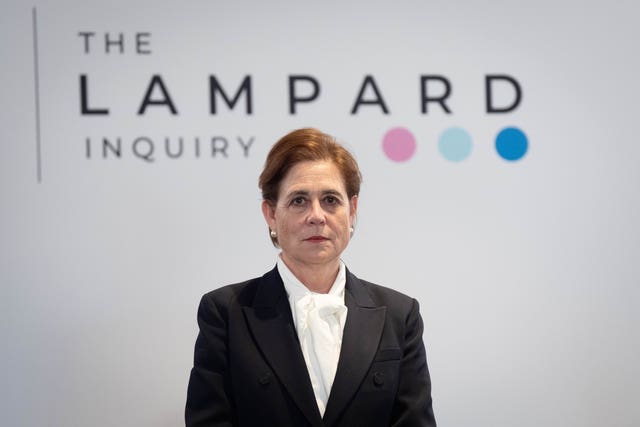Mental health inquiry into patient deaths to hear from health and safety execs
Hundreds died while under the care of the Essex Partnership University Foundation NHS Trust and the North East London Foundation Trust.

An inquiry into the deaths of more than 2,000 people while under the care of mental health services in Essex is to hear evidence from health and safety professionals.
The Lampard Inquiry is examining deaths at NHS-run children and adult inpatient units in Essex between 2000 and 2023 and has previously heard from grieving families about the care their loved ones received.
Last year the chairwoman of the inquiry, Baroness Kate Lampard, said “we may never know” the true number of people who died, but warned it is expected to be “significantly in excess” of the 2,000 deaths previously reported.

All the patient deaths occurred while people were under the care of the Essex Partnership University NHS Foundation Trust, (EPUT) and the North East London Foundation Trust (NELFT).
The inquiry, which has moved to Arundel House in London from Essex for the next stage of hearings, is not looking at deaths in the community unless they happened within three months of discharge from a mental health unit, the patient had been refused a bed or they were on a waiting list for a bed.
For the latest stage of hearings, which runs from Monday to May 15, the inquiry will hear from organisations including the Parliamentary and Health Service Ombudsman (PHSO) and the Health and Safety Executive (HSE).
Melanie Leahy, whose 20-year-old son Matthew died while under the care of the Linden Centre in Essex, will be joined by fellow campaigners outside the hearing on Monday.
She said: “It’s been years of heartbreak, unanswered questions, and fighting just to be heard, having lost two loved ones to a system that was supposed to care for them.
“We cannot ignore the reality that over 2,000 deaths under Essex mental health are under investigation. That number keeps growing.
“Behind every statistic is a person – a son, a daughter, a friend. This is not just numbers on a page, these are real lives that have been cut short.
“This inquiry is more than a box-ticking exercise. It’s a chance to bring the truth to light. Our loved ones cannot rest in peace until the truth about the mental health failings is exposed.
“If the inquiry does nothing to change the poor services, people will continue to be abused, overmedicated, and die.”
Nina Ali, a partner at Hodge Jones & Allen, which represents 126 families, said: “This is a pivotal moment for our clients, the enormity of which we hope is not lost on anyone who provides evidence during this section of the inquiry.
“We must hold a mirror up to our mental health services and face the grave reality that our clients have suffered and are continuing to suffer.
“We are deeply concerned that these issues are not solely exclusive to Essex.
“We are hopeful that everyone will come to the inquiry with the same aim – to expose the truth. Without full transparency, lessons can not be learned, and lives will still be lost.”
Paul Scott, chief executive of Essex Partnership University NHS Foundation Trust, said: “As the inquiry progresses, there will be many accounts of people who were much loved and missed over the past 24 years and I want to say how sorry I am for their loss.
“All of us across healthcare have a responsibility to work together to improve care and treatment for all and to build on the improvements that have already been made over the last 24 years.”





